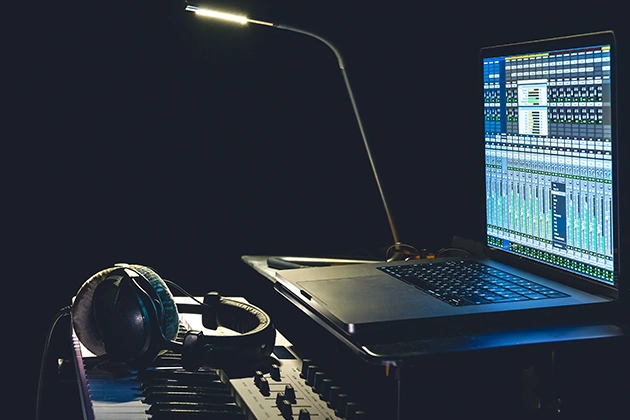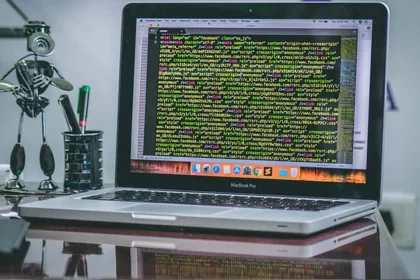In an age defined by technology, the stakes in audio production have never been higher. Artists, musicians, and filmmakers aim for perfection. Using advanced tools like artificial intelligence (AI) gives them a competitive edge.
Faster editing, better sound quality, automated workflows, and affordable content creation are just a few amazing benefits. Using AI in audio production lets professionals work more efficiently and explore new creative limits.
The changing landscape raises an important question: How can industry players use AI to boost their production efficiency and artistic vision? Read on to learn more.
The Evolution of AI in Audio Production
Over the past few years, AI has dramatically revolutionized audio production. Innovations in machine learning and deep learning techniques have transformed traditional audio workflows. Examples include AI-based tools that analyze sound frequencies, suggesting adjustments for optimal sound quality. This capability enhances the producer’s ability to create a polished final product swiftly and efficiently.
According to a Statista report, the AI audio production market is expected to grow significantly, demonstrating a rising demand for such technologies. Audio engineers and producers now have access to smarter tools that learn from previous data to improve future projects. This capability fundamentally changes the way audio is produced, enabling a model characterized by speed and precision.
Benefits of AI in Audio Production
Leveraging AI can bring multiple advantages to your audio production. Below are some key benefits:
Efficiency
The automation of tedious tasks such as noise reduction and audio restoration by AI is a game-changer in the industry. This saves professionals a lot of time. They can use that time for creative work. It also lowers the chance of human errors.
For instance, in audio post-production, AI can quickly identify and remove unwanted background noise, allowing sound engineers to focus on perfecting the mix. By doing so, AI increases productivity and enables professionals to deliver high-quality results within tight deadlines.
Enhanced Sound Quality
Real-time analysis of sound quality by AI algorithms ensures that audio meets professional standards. These smart algorithms find tiny flaws and quickly adjust them. This ensures great sound quality.
AI sound systems at live concerts fix distortions right away. This helps the audience enjoy a more immersive and engaging performance. By leveraging AI, musicians and sound engineers can focus on delivering an exceptional experience, rather than worrying about technical issues.
Cost-Effective Solutions
The automation of various processes by AI significantly reduces labor costs, allowing organizations to allocate resources more efficiently. By minimizing the need for manual intervention, AI-powered solutions enable companies to achieve high-quality outputs while keeping costs in check.
A good example is the music streaming industry. AI audio mastering tools have cut the need for costly manual mastering. This change makes high-quality audio easier for both artists and listeners to access.
Creative Exploration
AI tools have opened up new avenues for creative exploration in the music industry. AI helps artists by automating boring tasks. It gives them new tools to try out fresh sounds, designs, and production methods.
AI-powered plugins can create unique soundscapes and textures. This helps musicians explore their creativity and make fresh, inventive music.
Automation in Audio Workflows
One of the most impactful uses of AI in audio production is workflow automation. Tasks such as leveling audio, applying effects, and segmenting tracks can be efficiently automated. This automation not only speeds up production timelines but also minimizes human error.
Furthermore, AI-driven voice over generators have begun to emerge as powerful tools in the industry. These systems can create realistic and expressive audio narratives in minutes, significantly reducing the time creators spend on recording and editing.
Quality Control through AI
Maintaining high-quality standards is crucial in audio production. AI tools can assist in quality control by detecting inconsistencies and imperfections that may go unnoticed by human ears. These tools leverage advanced algorithms to conduct comprehensive audio analysis.
Consider a scenario where a musician records a track. With AI software, they get quick feedback on pitch fixes, frequency balance, and sound clarity. This immediate feedback loop enables artists to refine their work on-the-go, leading to better results with less time spent.
Enhancing Collaboration and Communication
AI also enhances collaboration between different audio production teams. By utilizing cloud-based platforms powered by AI, different stakeholders can communicate more effectively, share files, and track revisions in real-time.
For instance, a producer and sound engineer working on a project can collaborate seamlessly, even from remote locations. Using advanced AI tools helps everyone stay aligned. This cuts down on miscommunication and boosts production efficiency.
Cost-Effective Content Creation
In today’s dynamic content landscape, brands are continuously looking for ways to create engaging material without breaking the bank. AI-driven solutions provide a robust framework for developing high-quality content quickly and affordably. Automated processes, such as audio mixing and mastering, eliminate the need for extensive human resources.
Moreover, the use of a voice over generator can substantially reduce costs and time. This technology allows businesses to generate voice overs in various tones, accents, and languages, giving them the freedom to tailor their content to different audiences across the globe while maintaining consistency.
Ethical Considerations in AI Audio Production
While the benefits of AI in audio production are substantial, ethical considerations must also be examined. As AI continues to integrate into creative processes, concerns arise about the authenticity of content. When utilizing AI-generated audio, questions regarding copyright and ownership come to the forefront.
As the lines blur between human-generated and AI-generated content, there is an increasing need for industry regulations to protect the rights of artists and producers. Balancing innovation with ethical standards should be a priority as we traverse this new frontier.
The Future of Audio Production
Looking ahead, one thing is crystal clear: harnessing AI in audio production will continue to reshape the industry. As technologies evolve, we can expect enhancements in audio clarity, personalization, and engagement. Industry professionals are encouraged to adopt these innovations to remain competitive.
Furthermore, increased collaboration between AI developers and audio professionals can lead to more refined tools that address specific needs in the production process. As a result, we might witness a new wave of creativity powered by AI, marking a significant departure from traditional methods.
Harnessing AI in Audio Production
In summary, the strategic advantage of harnessing AI in audio production can lead to unprecedented efficiencies, superior sound quality, and reduced costs. The future is promising as the audio landscape transforms through advancements in technology. Embracing these changes not only enhances production processes but also opens doors for creative possibilities.
Start exploring how AI can revolutionize your approach to audio production today.









